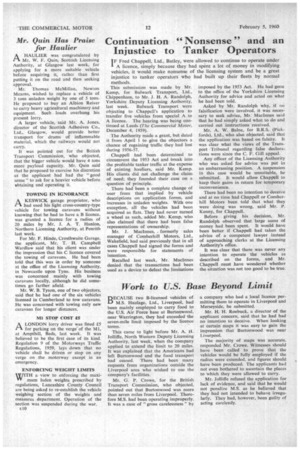Continuation " Nonsense " and an Injustice to Tanker Operators
Page 56

If you've noticed an error in this article please click here to report it so we can fix it.
IF Fred Chappell, Ltd., Batley, were allowed to continue to operate under A licence, simply because they had spent a lot of money in modifying vehicles, it would make nonsense of the licensing system and be a great
injustice to tanker operators who had built up their fleets by normal methods.
This submission was made by Mr. Kemp, for Bulwark Transport, Ltd., Chippenham, to Mr. J. H. A. Randolph, Yorkshire Deputy Licensing Authority, last week. Bulwark Transport were objecting to Chappell's application to transfer five vehicles from special A to A licence. The hearing was being continued at Leeds (The Commercial Motor, December 4, 1959).
The Authority made a grant, but dated it from April 1 to give the objectors a chance of regaining traffic they had lost during 1956-57.
Chappell had been determined to circumvent the 1953 Act and break into the profitable tanker traffic at the expense of existing hauliers, said Mr. Kemp. His clients did not challenge the claim of need; they founded their case on a question of principle.
There had been a complete change of user from that implied by vehicle descriptions on application forms, and increases in unladen weights. With one exception, all the vehicles had been acquired as flats. They had never turned a wheel as such, added Mr. Kemp, who also claimed that there had been false representations of ownership.
Mr. J. Machines, formerly sales manager of Comberhill Motors, Ltd., Wakefield, had said previously that in all cases Chappell had signed the forms and were responsible for statements of intention.
Recalled last week, Mr. Maclnnes denied that the transactions had been used as a device to defeat the limitations imposed by the 1953 Act. He had gone to the office of the Yorkshire Licensing Authority for advice and acted on what he had been told.
Asked by Mr. Randolph why, if no falsification were involved, it was necessary to seek advice, Mr. MacInnes said that he had simply asked what to. do and carried out instructions received.
Mr. A. W. Balne, for B.R.S. (Pickfords), Ltd., who also objected, said that the application was based on falsity. It was clear what the views of the Transport Tribunal regarding false declara, Lions were since the C. F. Gill appeal.
Any officer of the Licensing Authority who was asked for advice was put in an embarrassing position. A suspension in this case would be unsuitable, he submitted. It would allow Chap:pH to keep their gains in return for temporary inconvenience.
There had been no intention to deceive and at no time had Chappell or Comberhill Motors been told that what they were doing was wrong, said Mr. P. Kenny, for Chappell.
Before giving his decision, Mr. Randolph observed that large sums of money had been spent. It would have been better if Chappell had taken the advice of a competent lawyer instead of approaching clerks at the Licensing Authority's office.
It was clear that there was never any intention to operate the vehicles as described on the forms, and Mr. Chappell must have wondered whether the situation was not too good to be true.




























































































































